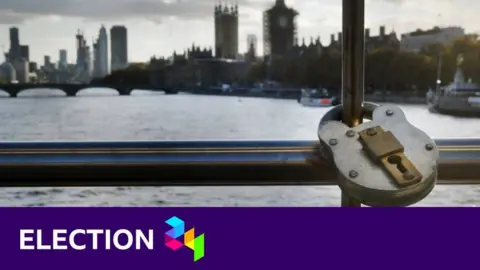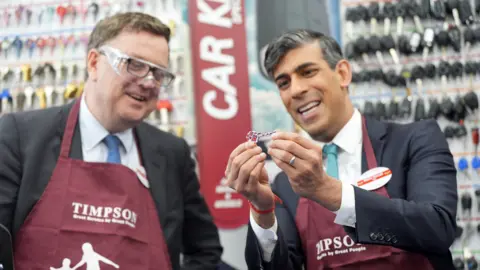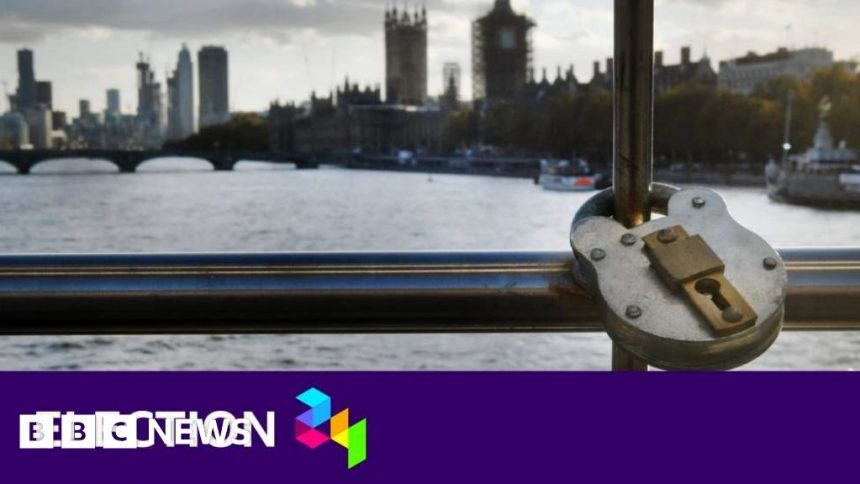Why do politicians keep talking about locks?
 Getty Images
Getty ImagesHave you heard of the fiscal lock? Would the nuclear deterrent triple lock get your vote? What about the Triple Lock Plus?
During this election campaign we have heard a lot of talk about political “locks”: promises made by politicians to do – and, increasingly, not to do – certain things.
For parties, this sort of sloganeering has become a necessary part of the political process, ensuring their promises in complicated policy areas can be presented to voters in a way that fits into headlines and onto election leaflets.
It is perhaps no surprise that, as levels of trust in British politics continue to decline, the lock’s popularity as a political metaphor has risen.
But why has it become the go-to phrase for politicians hoping to sell a policy? And will they ever stop?
‘Triple lock’
The language of political pledges is still dominated by the “triple lock” – the now widely adopted policy of increasing state pension payments every year by the highest of inflation, average earnings or 2.5%.
Originally a Lib Dem manifesto commitment at the 2010 election, it was embraced by the Conservatives when the two parties entered office together afterwards.
It has been in place ever since, save for a temporary suspension during the Covid pandemic, and has also been adopted by Labour.
Back in 2010, in the 36-page document setting out the Lib Dems and Tories’ joint blueprint for power, it was referenced as the “triple guarantee”.
The only “lock” in that document was David Cameron’s “referendum lock” to hold a vote if the UK transferred further powers to the EU.
This pledge was eventually given legal backbone, but later consigned to the political dustbin as Cameron promised, and then famously lost, a wider vote on the UK’s EU membership.
 Getty Images
Getty ImagesUnlike the referendum promise, the pensions pledge – rebranded the “new triple lock” at the 2010 Budget – was never turned into a law.
But Chris Hopkins, political research director at polling company Savanta, says the fact it has lasted long as a policy could explain why today’s generation of politicians are so keen to embrace the same language for their own promises today.
“The triple lock has become such in British politics that daring to unlock it has become a political minefield,” he adds.
Whether that’s because of the policy itself or the metaphor is “hard to say,” he says, but adds that there is at least an “assumption” among politicians that the language of the pensions promise has resonated with voters.
He also suggests that in “an age of very low trust in politicians,” it offers them a useful way to convince voters they are offering promises that “can’t be broken”.
 Getty Images
Getty ImagesLabour has also experimented with the metaphor. At the 2014 independence referendum, ex-PM Gordon Brown offered Scottish voters three “lock-ins” to transfer further powers if they opted to stay in the UK.
At the following year’s general election, the party’s manifesto contained a “Budget responsibility lock” of related policies to persuade voters they could be trusted to manage the economy responsibly.
Neither has lingered long in political memories.
But it has not stopped Sir Keir Starmer’s party, along with Rishi Sunak, adapting the Cameron-era political dictionary again when drawing up manifesto promises.
This time around, we have the:
- Triple Lock Plus: a Tory commitment to raise the personal allowance for pensioners to guarantee they will never pay income tax on their annually uprated state pensions;
- Tax lock: Sir Keir Starmer’s offer to not raise rates of income tax, National Insurance or VAT (the Tories and Lib Dems have made the same promise);
- Fiscal lock: A Labour pledge, in the wake of Liz Truss’s premiership, to not to set a Budget without the impact of decisions being calculated beforehand by official economists, and;
- Nuclear deterrent triple lock: A trio of linked commitments from Labour to maintain the UK’s nuclear-weapons system.
Tellingly, perhaps, Labour’s locks are are largely focused on maintaining the status quo in the relevant policy areas.
Karl Pike, a former Labour adviser who now lectures in British politics, says embracing the language of locks has given the party a way to burnish its security-focused pitch to voters in key areas.
It also gives the impression, he notes, that something is “beyond normal political decision-making” and therefore “cannot be undone”.
He also says it is not the first time that Starmer’s Labour has reappropriated a political slogan for its own ends.
He points out that the party’s promise of a “Take Back Control Act” to transfer more powers to local mayors is an attempt to tap into the success of the slogan made famous by the official campaign to leave the EU.
‘Less convincing’
But although the political “lock” appears here to stay – is there a danger that the metaphor’s power is beginning to wane?
“It feels like the less people trust politicians’ promises, the more they have to up their rhetoric when promising things,” says Robert Colvile, the boss of the Centre for Policy Studies think tank and co-author of the 2019 Tory manifesto.
He likens the logic behind the trend for “locks” to the so-called EdStone – Ed Miliband’s much-pilloried attempt to win trust for his key pledges at the 2015 election by engraving them on a large stone tablet.
“The problem is that the more people use this language, the less convincing it becomes,” he adds.
It’s a sentiment shared by Karl Pike, who warns that over-use could mean the phrase starts to “lose meaning”.
He adds that lock has become the “current rhetoric” within politics, but New Labour was fonder of a different metaphor, the “contract”, which could even have its time in the sun again ten years from now.
“Politicians do latch on to particular kinds of phrases,” he adds.
“Whether they’ve been tested or not, whether they are effective or not, they’ve decided they have a kind of political currency”.







